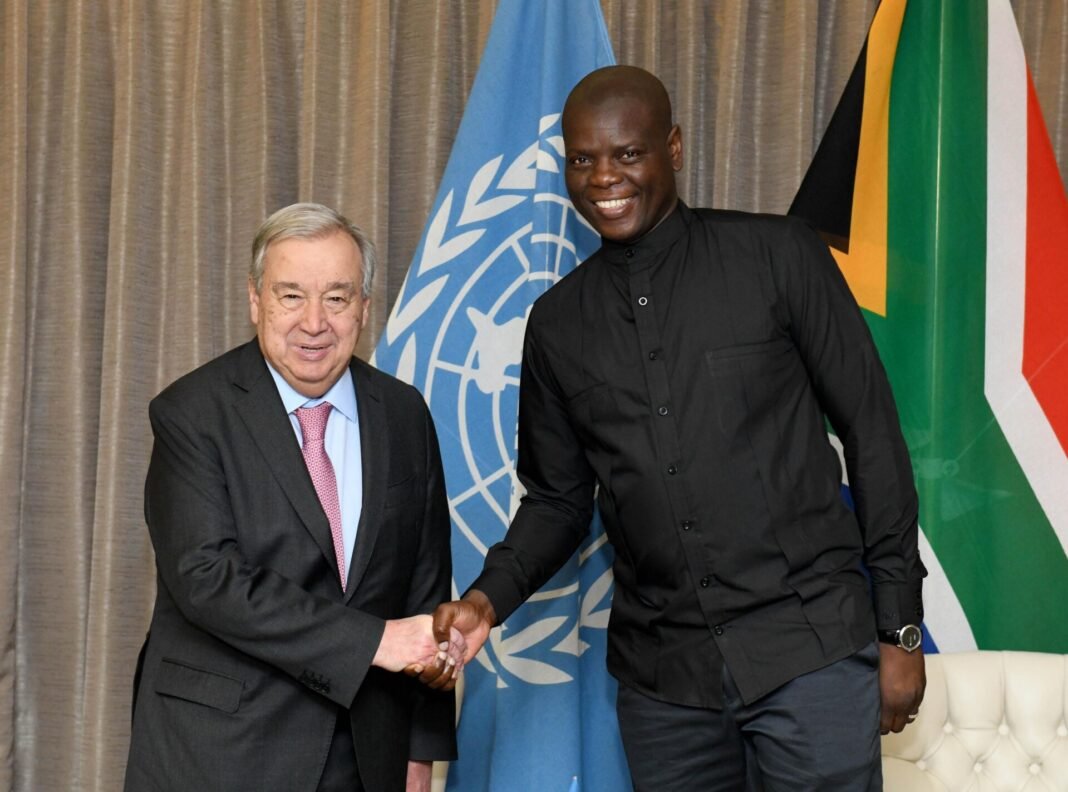Arrival and Initial Engagements
On December 11, the Secretary-General arrived in South Africa, having traveled from New York. This visit is significant as it positions the Secretary-General at the heart of crucial discussions surrounding global priorities, notably within the context of his attendance at the G20 meeting in Johannesburg. The significance of South Africa as the host nation for this pivotal gathering cannot be understated, particularly in light of its leadership role in representing emerging economies and developing nations on the global stage.
Upon arrival, the Secretary-General engaged with various stakeholders, reinforcing the importance of collaborative dialogue in addressing pressing global challenges. His remarks during the initial engagements highlighted the urgent need for concerted action on several fronts, including climate justice. The inclusion of climate justice in the discussions at the G20 meeting is timely; it underscores the responsibilities that G20 nations bear in mitigating environmental crises and fostering sustainable development. It is imperative that these nations not only recognize their significant carbon footprints but also commit to equitable solutions that aid those most affected by climate change.
At the G20 sherpas and finance deputies meeting, the Secretary-General articulated key themes that align with his broader agenda of promoting sustainable economic growth and social equity. His emphasis on the necessity for G20 countries to lead by example in climate action serves as a call to accountability. The meeting provided a platform for the Secretary-General to reiterate that immediate and far-reaching measures are necessary to combat the detrimental impacts of climate change. Such dialogues are essential, not only for addressing environmental concerns but also for fostering a united front among G20 countries to drive forward meaningful policy changes.
Bilateral Discussions in Pretoria
Following his engagements in Johannesburg, the Secretary-General proceeded to Pretoria, where he engaged in pivotal bilateral discussions with Ronald Lamola, South Africa’s Minister for International Relations. These conversations were not only significant for their immediate context but also for their broader implications in relation to the pressing global issues of solidarity and justice. The Secretary-General’s mission emphasized the importance of collective action among nations, particularly in light of South Africa’s presidency of the G20, which places it in a crucial position to influence international policy.
The discussions aimed to strengthen the partnership between South Africa and the United Nations, emphasizing the critical role that both entities play in navigating global challenges. The Secretary-General articulated his commitment to fostering a shared understanding of justice and equity in international relations, particularly as these concepts pertain to marginalized communities worldwide. As South Africa seeks to align itself with the objectives of the G20, the Minister underscored the need for inclusive growth and sustainable development, echoing the sentiments expressed by the Secretary-General.
An important point of focus during the meeting was the impact of current geopolitical tensions on global governance structures. The Secretary-General expressed concern over rising inequalities and the impacts of climate change, encouraging South Africa to take a lead in advocating for transformative policies within the G20 framework. Both leaders recognized that the nation’s unique historical and socio-economic context positions it well to champion initiatives that prioritize justice and shared prosperity on the international stage.
This collaboration serves as a testament to the ongoing commitment between the United Nations and South Africa to tackle the multifaceted challenges that the world faces today. The successful exchange of ideas during these bilateral discussions is critical in shaping a future that aligns with the principles of solidarity and justice, which are central to both parties’ agendas.
Political Context and Regional Challenges
During his recent visit to South Africa, the Secretary-General took the opportunity to address a range of pressing regional challenges, with a particular emphasis on the complex political dynamics of the Middle East. His commentary shed light on the ongoing plight of the Palestinian people, drawing attention to their quest for self-determination. This issue remains a critical focal point in discussions surrounding Middle Eastern geopolitics, reflecting broader themes of autonomy, rights, and international law.
The Secretary-General articulated the necessity for renewed dialogue among stakeholders, emphasizing the importance of understanding the historical contexts that underpin current tensions. His remarks suggested that achieving peace in the region requires recognizing both the aspirations of the Palestinian people and the security concerns of Israel. To facilitate this, he advocated for a multilateral approach that involves regional actors and international partners, reinforcing the belief that sustainable resolutions can only be achieved through comprehensive negotiation and cooperation.
In addition to the Palestinian situation, the Secretary-General’s statements explored the shifting power dynamics in the Middle East. With the ongoing developments in Syria and the precarious balance of influence among regional powers, the importance of diplomatic engagement and conflict resolution was underscored. The implications of these changes extend beyond national borders, as new alliances and rivalries emerge, potentially affecting global stability.
Furthermore, the Secretary-General’s observations on Syria illustrated the dire humanitarian crisis persisting in the aftermath of years of conflict. The call for coordinated international efforts to address the suffering of the Syrian populace highlighted the urgent need for comprehensive strategies aimed at restoring peace and enabling effective governance in the region.
Meeting with President Cyril Ramaphosa
On December 11, the Secretary-General met with President Cyril Ramaphosa in a significant dialogue aimed at discussing various pressing issues pertinent to South Africa’s priorities, especially in relation to its upcoming G20 presidency. This meeting served as an essential platform for both leaders to align their agendas and strategize on critical areas of collaboration between the United Nations and South Africa. A key topic on the agenda was the country’s commitment to promoting sustainable development and an inclusive economy during its tenure in the G20.
President Ramaphosa expressed South Africa’s determination to prioritize developmental challenges at the G20 summit, particularly in the wake of economic difficulties exacerbated by global crises. The Secretary-General acknowledged these efforts, noting that enhancing international cooperation will be vital for addressing issues such as climate change, financial stability, and food security. They discussed how South Africa could leverage its G20 presidency to advocate for the interests of African nations and ensure their voices are heard globally.
Additionally, the discussions emphasized the importance of combating inequality and fostering social cohesion. Both leaders recognized the role of global partners in supporting South Africa’s initiatives, particularly in advancing the 2030 Agenda for Sustainable Development. The Secretary-General reaffirmed the UN’s commitment to support South Africa through enhanced partnerships and technical assistance in its efforts to meet these ambitious goals.
The implications of their conversation extend beyond national policies; they have the potential to shape international discourse on several critical issues facing the world today. By prioritizing development, the South African presidency at the G20 could influence global decisions regarding financing, environmental sustainability, and health security. This meeting marked a pivotal moment in fortifying the collaborative framework between South Africa and the UN, setting the stage for proactive engagement on the global stage.

 from Africa, Asia and United Nations here for your comfort in different languages, but you can click on our translator in different languages on our Website.
from Africa, Asia and United Nations here for your comfort in different languages, but you can click on our translator in different languages on our Website.
